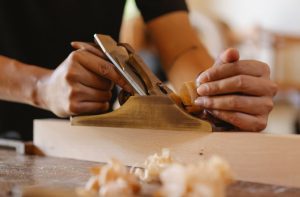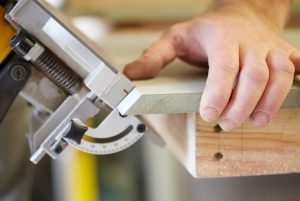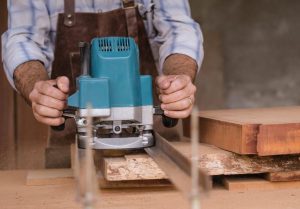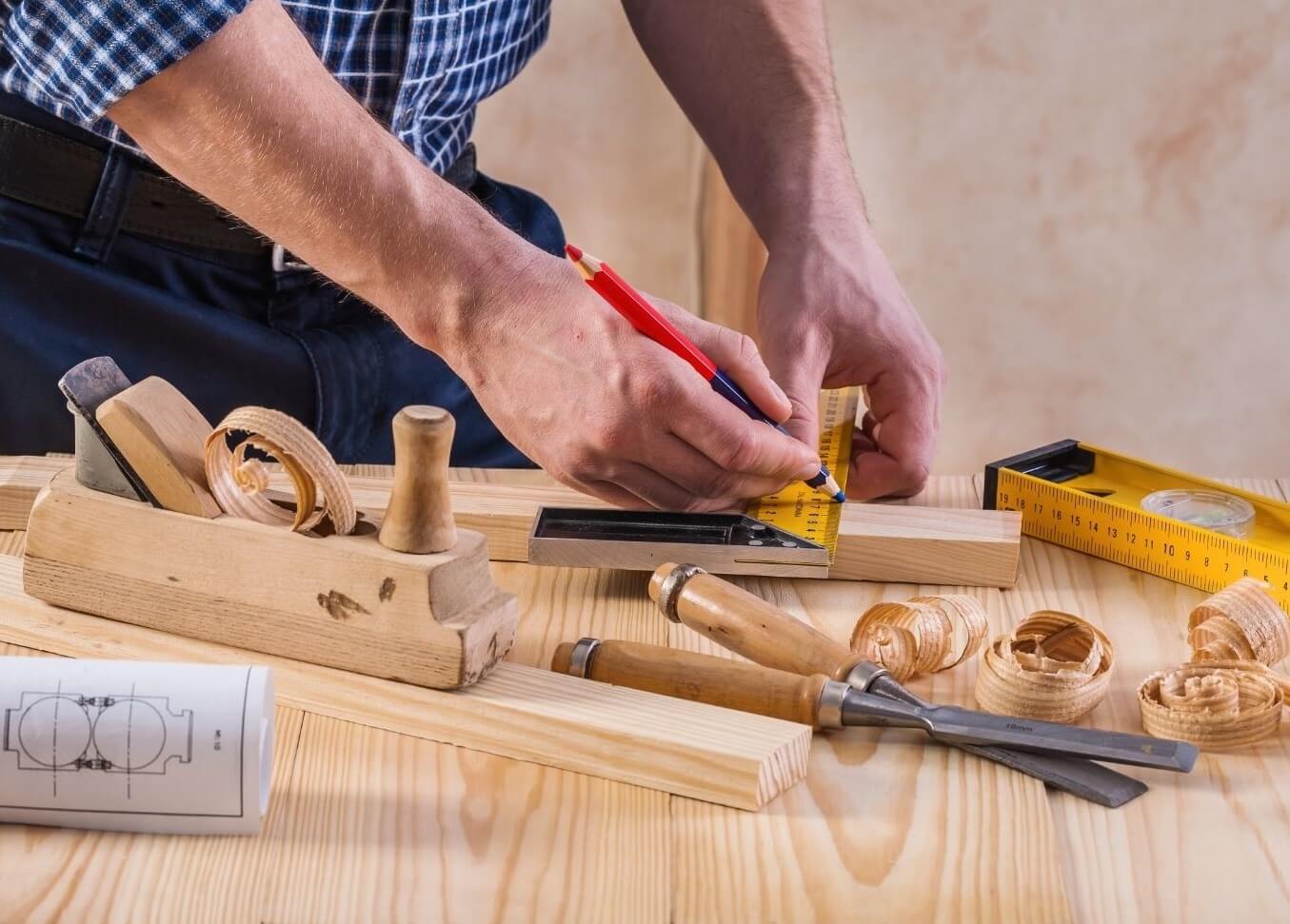What Are the Main Types of Joiners?
To become a joiner, one typically need a combination of education, training, and hands-on experience. A joiner is a craftsperson who works with wood to create structures, fittings and furniture. Unlike a carpenter, who often works outdoors on-site, a joiner usually works in a workshop, building components that will be assembled or installed on the building site. The different types of joiners can be divided into the following categories:
- Bench Joiner: A bench joiner works in a workshop and specializes in creating wood products such as doors, windows, staircases, and furniture. They use machinery and hand tools to craft precise components for construction or installation.
- Finish Joiner: Finish joiners focus on the finer details of joinery work, ensuring that the final product is polished and ready for installation. They might work on skirting boards, door frames, and other finishing touches that require high levels of precision and detail.
- Shopfitter: Shopfitting joiners specialize in fitting out retail and commercial spaces. They design, create, and install bespoke shelving units, counters, and display areas, ensuring that shops and commercial premises are both functional and aesthetically pleasing.
- Cabinet Maker: Cabinet makers are joiners who specialize in creating furniture, particularly cabinets and other types of bespoke woodwork. They work with fine woods and often create high-end, custom pieces for clients.
- Roofing Joiner: These joiners focus on constructing the wooden framework of roofs. They build and install the timber supports for pitched roofs and are often involved in the construction of trusses, rafters, and beams.
- Frame Joiner: Frame joiners are responsible for creating the structural framework of buildings. This may include constructing timber frames for houses or other structures, ensuring that the framework is strong and secure.
- Restoration Joiner: Restoration joiners specialize in working on historic buildings or old woodwork. They repair, restore, and recreate wooden components that match the original design and style of the building.

What Does a Joiner Do?
To become a joiner refers to a craftsman who works with wood to assemble and build components or furniture. Often, joiners work in a workshop where they create detailed wooden structures installed on-site. In this particular example, the role of a joiner is outlined in detail:
- Read and Understand Technical Drawings: To become a joiner, you must understand technical drawings, blueprints or designs to create components according to the requisite specifications.
- Work with Wood: To become a joiner, you use wood to cut, shape, and assemble structures such as doors, windows, stairways, and furniture.
- Use Hand and Power Tools: To become a joiner, you use a wide variety of hand tools (such as saws, chisels and hammers) and power tools (such as routers, planers and sanders) to cut and assemble wood.
- Measure and Cut Materials: To become a joiner, you must cut materials to the correct size and fit. Great precision is needed to work in joinery.
- Joinery tasks: Once the components are cut and shaped, joiners assemble them using dovetail joints, dowels, and glue. The resulting pieces should be functional and beautiful.
- Install wood products: Some joiners, although they might work in a workshop, can also install the components they have made on-site, such as fitting doors, windows or other woodwork.
- Finish Wood Surfaces: Finally, joiners sand, stain, or varnish wood to protect it from damage and make it look appealing. This makes the wood ready for use and also achieves their aesthetic goals.
- Get on With Other Trades: To become a joiner, you are often employed by carpenters, builders, and other tradespeople to ensure that their work fits into a larger building project.

Average Joiner Salary
A joiner’s salary in the United Kingdom is determined by their experience, work type and where they work. To become a joiner who do high-quality custom work or in urban areas often earn more than those who do basic carpentry work in the countryside. Here is an outline of typical joiner salaries.
- Starting salary: Entry-Level Joiner: £18,000 to £25,000 per year. Especially for those who start with an apprenticeship or assistant.
- Experienced Joiner: An experienced joiner can expect to earn between £25,000 and £35,000 a year and more for specialised skills or complex projects.
- Senior Joiner: £35,000-£45,000+ per year Senior or highly trained joiners can earn £35,000-£45,000+ per year. Those who work on bespoke jobs, restoration work, or in large cities might earn even more.
Joiner Skills
You must learn to work as a joiner, that is, to handle and work materials practically, craft them and put them together using technical skills. Here are the skills you need to become a successful joiner.
- Manual dexterity: To become a joiner, you need good hand-eye coordination and manual dexterity to use tools and materials effectively.
- Technical Knowledge: Interpreting and using technical drawings and blueprints is an integral part of the job, as is knowing the characteristics of different types of wood.
- Paying attention to detail: Care and concentration are fundamental requirements in joinery work. Measuring the wood correctly and making precise cuts are essential for a high-quality product.
- Problem-solving skills: To become a joiner, you need to think things through and devise ways to solve problems that arise while things are being built or put up.
- Mathematical Skills: The Joiner’s ability to do basic mathematics is a fundamental requirement. When measuring materials and calculating angles and dimensions, the Joiner must be comfortable with geometry and arithmetic.
- Tool Proficiency: To become a joiner, you must know how to use both hand and power tools. The latter include drills, jigsaws, table saws, miter saws, sanders, router tables, jointers, and planers, among others.
- Physical Strength and Stamina: Physical strength and stamina are required for lifting and moving heavy materials, as well as working with power tools while standing for long periods.

Joiner Tips
For those who are just starting a career as a joiner, here are some helpful tips:
- Get an Apprenticeship: An apprenticeship is the traditional way for many joiners to start work. It gives you on-the-job training while you learn from those who know how to do it well.
- Create a robust portfolio: As you finish projects, take photos and write descriptions of your work to show future employers or clients.
- Use good tools: a joiner’s tools are important, and if you invest in the good ones, they will last. Keep them in good condition.
- Networking: Like any business, you’ll want to network with carpenters, builders, and other tradespeople to foster relationships and opportunities for collaboration and work. Attend a trade show or local event to find others in your field.
- Continuing education: Joinery techniques and tools change and develop. To stay on top of new trends and technologies, you need to learn about them. Attend workshops, read magazines, and subscribe to newsletters.
Joiner Requirements
While formal education isn’t always required, completing an apprenticeship or earning a qualification can significantly improve your career prospects. Here are the common requirements for becoming a joiner:
- Apprenticeship in Joinery: Many joiners begin their careers by completing a Level 2 or 3 Apprenticeship in Joinery. Apprenticeships provide on-the-job training and allow you to learn from experienced joiners.
- Vocational Qualification: Some joiners may choose to complete a Diploma in Bench Joinery or a Diploma in Carpentry and Joinery. These qualifications can provide a solid foundation in joinery skills and techniques.
- Work Experience: Hands-on experience is essential in joinery. Whether through an apprenticeship, entry-level job, or working as an assistant to a joiner, gaining experience will help you refine your skills.

How to Become a Joiner
Here’s a step-by-step guide to becoming a joiner in the UK:
- Finish secondary school: Get your GCSEs. Maths, design and technology are important. Then, you have a base for your training.
- What to do next: Find a Level 2 or 3 Apprenticeship in Joinery, combining work on a site with a qualified professional. Apprenticeships take between two and four years.
- Further Education: To improve your skills, you can take a Diploma in Carpentry and Joinery to obtain formal qualifications in your trade.
- Accumulate practical experience: start working as a trainee or junior Joiner and collect experience with various projects. Practical experience in all sorts of projects will keep your skills razor-sharp.
- Specialise: If you have many years of experience, you are now in a good position to specialise in a particular type of joinery, maybe cabinet making or restoration. Specialisation can help you make yourself unique and give you greater employment opportunities.
- Keep Learning and Growing: Joinery is a trade that will always change, so staying updated on tools, techniques, and trends is important. Take classes, learn more, and invest in good tools.
Frequently Asked Questions
Why Should You Become a Joiner?
Joinery is a rewarding career if you enjoy working with your hands, producing beautiful and functional structures, and being part of building and refurbishment projects. Joiners are in high demand, and there are excellent opportunities for progression in your career, job security and the possibility of self-employment. If you are a fan of making things with wood and enjoy seeing what you’ve made, then a career as a joiner can be incredibly fulfilling.
Is Being a Joiner a Good Career Choice for You?
For anyone who likes working with their hands and enjoys solving practical problems, joinery is a great trade to get into. It can mean working in anything from a furniture workshop to being on-site, fitting doors and windows in new builds. Work is varied and interesting, and you have a lot of autonomy and independence. You’ll work with your hands all day, so it’s not an office-based role. Don’t be put off if you don’t like making things, though – you could still become a joiner.
Joiner Salaries
Earnings for joiners in the UK range from £18,000 to £45,000+ depending on experience, specialism and location. Entry-level joiners can expect to earn between £18,000 and £25,000. Joiners with experience or specialisms can earn between £35,000 and £45,000+. Those running joinery businesses or taking on high-end projects can earn much more.
Which Qualifications Can Help with a Career as a Joiner?
Finishing a Level 2 or Level 3 Apprenticeship in Joinery is the most common way in. Other qualifications include diplomas in Carpentry and Joinery or Bench Joinery. Other certifications in specialised joinery areas, such as cabinetry or shopfitting, will also help your career.
Do I Need Experience to Get Started as a Joiner?
Certainly, practical experience is important to being a good joiner. Most joiners start their careers by taking an apprenticeship, during which they learn the trade through practical experience while doing the job. Experience on the job is important to developing skills and understanding various tools, materials, and techniques in joinery.
Joiner Career Outlook
The demand for joiners is still rising, especially in construction and renovation. Joiners keep their jobs because buildings have to be built or renovated, as do the internal wood structures and fittings that joiners build and fit. The job prospects are generally good, too. There’s steady work to be found and the potential to progress into a more senior role, specialise, or start your own business.
Joiner Hierarchy and Progressing Within the Role
Joiners can work their way up the ranks from an apprentice or junior Joiner to a Lead Joiner, Master Joiner or Joinery Supervisor. Some joiners specialise in restoration work or bespoke furniture making. In contrast, others will move into management positions with construction companies or run their businesses.
Joiner Exit Options and Opportunities
Exit options for experienced joiners vary, including transitioning into allied fields such as carpentry, construction management or shopfitting; running their joinery businesses; taking management or leadership roles in larger organisations; or focusing on historic restoration, bespoke furniture making, coaching, and instruction.


